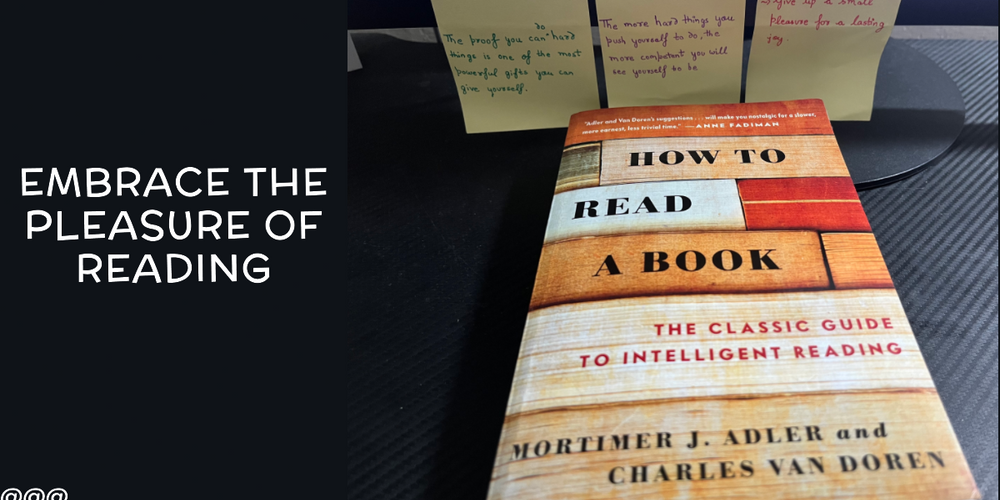📕 How To Read A Book 📕
-
 Bakul Gupta
Bakul Gupta
- July 31, 2023

In last month i.e July 2023, I was able to read an awesome book “How To Read A Book” by Adler & Doren , published in 1972 (read the touchman edition 2014)
Should you read it ?
- If you’re someone who is struggling to build a reading habit , or don’t know about when to read full book (line by line) or skim through it
- If don’t know how to read different types of books/materials not limited to Psychological/Fiction/Non-Fiction/Magazines/Articles/Historical/Sociological/Political/Stories/Novels, then definitely this book covers all those points in details.
⬇ Remember
Some books are to be tasted, others to be swallowed, and some few to be chewed and digested
Key Points
Foremost the author in beginning gives a lil bit motivation by saying
We do not have to know everything about something in order to understand it
which kinda resembles to a famous concept in Computer Science known as abstraction , usually taught during OOPs (object oriented programming) classes
| Abstraction : Hiding internal details of system
Example: When you drive a call, most of time you don’t know about the internal dynamics of car (such as how gears work, torque, friction etc). In similar way when you’re trying to learn something new , don’t worry about the consequences, just rememeber
A journey of thousand miles begins with single step
Moving forward, the author tries to put more emphasis on quality vs quantity i.e
it doesn’t matter how many books you’ve read.
But in real life, it matters how many principles from the books, one is able to in-corporate in real life.
Also there lies a major difference between
| Purpose | Objective |
|---|---|
| Reading for information | Skimming through |
| Reading for understanding | Learning more -> Reasoning |
| Reading for fun/entertainment | Individual’s choice |
Also, reading is sort of passive form of teaching, vs listening is sort of active teaching. But reading requires more efforts, and consciousness than listening in general.
There are four different levels of reading
- Elemenetary reading (where we understand the basis of language i.e school sessions)
- Inspectional reading (Pre-reading i.w what is the bookabout, author’s intention, skimming through the index)
- Analytical reading (Full -reading /complete reading)
- Syntopical reading (More advance form which requires extensible expository as well as comparative study)
In general author emphasises on the fact, that
One must know what kind of book you’re reading
What you can learn from the title of a book
👉 ❗️ Do not begin to about talk anything in general until you have listened carefully and are sure you understand
To agree without understanding is inane
To disagree without understanding is impudent
Most of time, possible we’ve encountered a situation where I don’t know what you mean, but I think you’re wrong
Great authors were great teachers/readers
In short, the author want us to understand the fact that before actually reading the book, do try to make following points
- Try to find the type of book (non-fiction -> self-help -> habit tracking)
- Try to find the purpose of book (practical book i.e need to learn some principle from book, or a novel)
- Run through the index, and intial few pages of book, to understand the author intention
- Complete the task of understanding
- Try to reason the author points (not too agressively) i.e when you dis-agree, do so reasonably.
- Find out the distinction between knowledge and opinions
- View disagreement as matter of knowledge
- Find the author intention (uninformed, misinformed, illogical, analysis is complete)
- Check whether the book demands intrinsic (no outside material required) or extrinstic type of reading.
As a matter of fact , initially one should focus on the intrinsic type of reading (that helps better to reason the author thoughts)
Tl;dr
- You must ask questions when you read
- What are the author’s objectives
- What the author intentions are ?
Problem
Most of the time people read the whole book, and then thereafter find it difficult to provide a clear/short description about the pros/cons of book
| Books Type | Purpose/How to read |
|---|---|
| Expository Books | Knowledge (research papers) |
| Imaginative books | Communicate an experience |
| Stories | Read it quickly and with total immersion |
| Historical | Read more than one book, to learn about the history of particular event |
| Science | What it is about ? , Purpose of author ? |
| Philosophy | Questions it tries to answers |
| Modern journalism | Question who/what/why/when/where related things |
| … | … |
Conclusion
Most of us waste time on books that deserve less attention
In general, look at all sides of book, and take no sides, atleast during the initial phases of reading.
Activity (reasoning) is the essence of good reading !!!
A good book can teach you about the world and about yourself
I’ve tried to cover minimal points about the book, but definitely if you’re an avid reader, and struggling to find out how to read a book well. Do give a try ,will be worth your precious time.
Time is money @@@,
🍻 Cheers,
B@kul Gupt@